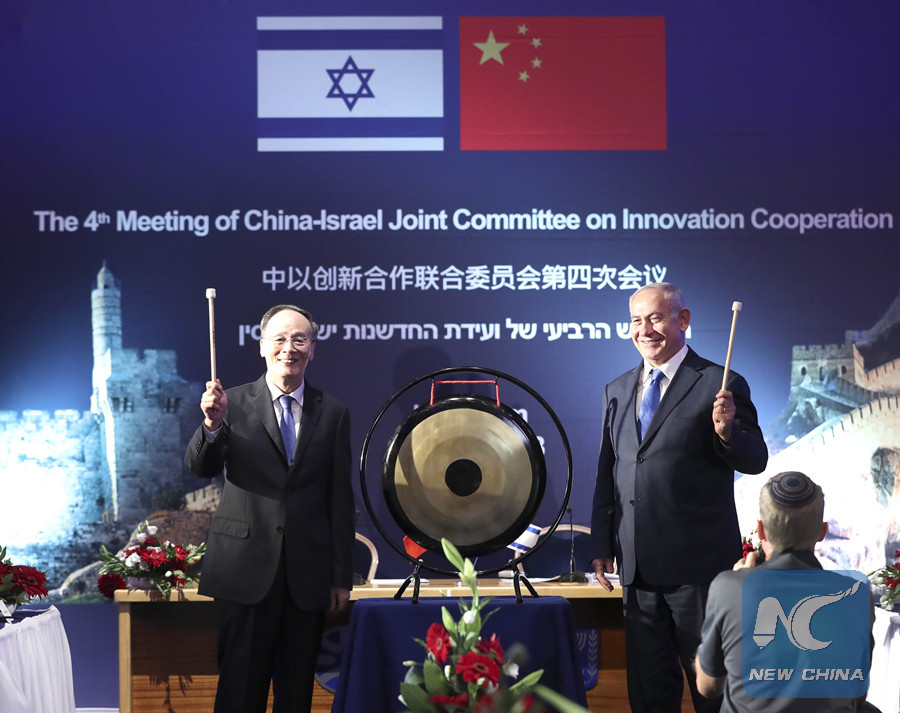
China's Vice President Wang Qishan and Israel's Prime Minister Benjamin Netanyahu attended the fourth meeting of the China-Israel Joint Committee on Innovation Cooperation on Oct. 24, 2018. (Xinhua photo/Pang Xinglei)
by Keren Setton, Nick Kolyohin
JERUSALEM, Oct. 25 (Xinhua) -- China and Israel are intensifying their joint efforts to tap into the vast potential of cooperation in innovation, which has benefited both sides.
China's Vice President Wang Qishan visited Israel this week and attended the fourth meeting of the China-Israel Joint Committee on Innovation Cooperation to bolster innovation cooperation between the two countries.
In an exclusive interview with Xinhua, Ami Appelbaum, chief scientist and chairman of the board of the Israeli Innovation Authority (IIA), said there is still work to be done on both sides in order to fully realize the potential of the bilateral relations.
"1+1 (China and Israel) will be much bigger than each one on its own," he said.
"The next step for the two countries will be Israeli and Chinese entities working together in the Chinese market," said Yaki Zinger, vice president of LR Group, an Israeli firm specializing in development and financing of large-scale projects in high-growth economies.
During the visit, Wang headed a large delegation with members from different ministries. A number of agreements were signed between the two countries, in fields including science and technology, life science, innovation, digital health and agriculture.
There are several arenas in which China and Israel have mutual benefits to offer. Biomedical field is one of them.
"The market in China is an excellent opportunity for us," Zinger told Xinhua. "We will bring the medical training center for medical staff to China and we have the backup of the Israeli Ministries of Economy and Finance."
Agritech, as Appelbaum believed, is another potential field of cooperation for both sides.
Israel is considered an agricultural powerhouse after years of experience of using technologies to overcome arid climate and disadvantageous conditions. The country is also considered a pioneer in the field of precision irrigation.
"For China, with its huge population, its agriculture sector is an area where I think both countries need to focus on to leverage our knowledge on one hand, and to explore needs and opportunities on the other, and to work together for the benefit of humankind," he said.
In the field of autonomous driving, there is also great potential. China, which is at the forefront of driverless vehicles, can benefit greatly from the thriving autonomous driving technology in Israel.

China's Vice President Wang Qishan met Israel's Prime Minister Benjamin Netanyahu in Jerusalem on Oct. 24, 2018. (Xinhua photo/Pang Xinglei)
The relations between the two countries began with the establishment of diplomatic ties in the beginning of the 1990s. As the two realized they complement each other, the bilateral economic relations have grown rapidly.
There is also increasing cooperation in the field of civil aviation.
Eli Alfassi, vice president of marketing at the Israel Aerospace Industries (IAI), believed that the future of cooperation is bright.
"IAI is planning to form a joint venture for general aviation aircraft design, manufacturing and sales in China," Alfassi told Xinhua.
"China's aviation industry is growing rapidly and IAI is a natural partner of Chinese companies, with our extensive knowhow and experience to help promote the field in China," he added.
However, challenges still remain, mainly cultural. There are differences in languages, customs and business practices to overcome.
To deal with the obstacles, more cultural interactions should be held between the two countries. And Chinese and Israeli employees should be encouraged to work together to make it easier to do businesses in each other's country, Appelbaum suggested.
In terms of economic relations, the Chinese and Israelis need to maintain open communication to assure mutual benefits, he said.

